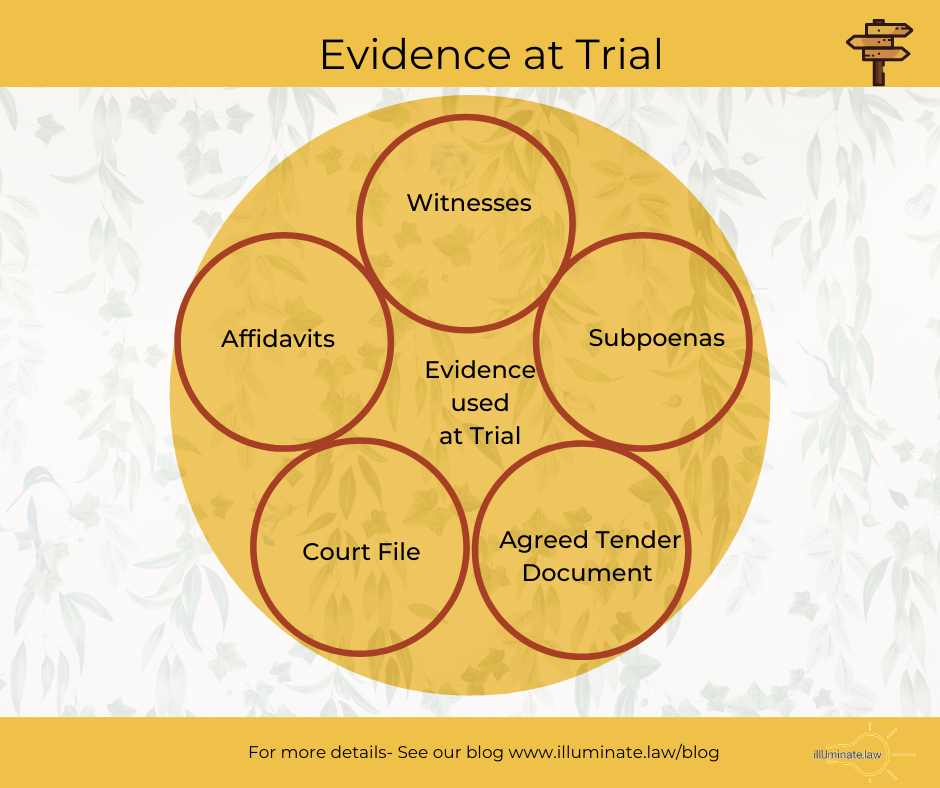
When your matter is approaching a trial, it will be absolutely essential for you to understand what information the Court has access to and what information you need to provide to it. You can’t assume that the judge who will be hearing your trial will have any knowledge of what has happened in the case up to now, and it is your responsibility to make sure that all the evidence you want them to consider is available for the trial. This means understanding the rules around admission of evidence. This is a complicated area, and legal advice on how to prepare your case can really help you avoid an issue that would have a big impact on your case.
This article is not legal advice, but points out some of the different way evidence can be put before a judge in a Family Court of WA trial.
Affidavits
During your case, you will have already submitted affidavits to the Court. Affidavits are evidence as they are a sworn statement of the person who signed them. You can annex other documents to an affidavit where the person making the affidavit can confirm its authenticity (eg photographs that person took, emails they sent or received, a report they wrote). However, once you are at trial, and unless you have orders to the contrary, the only affidavit that will count as your evidence is the final trial affidavit that you prepared prior to the Readiness Hearing. If you would like something that you have said in a prior affidavit to count as evidence at trial, you will need to seek leave to rely on that earlier affidavit, or repeat the evidence in your affidavit for trial.
It is very important that your trial affidavit is complete and correct. It is your last opportunity to present your side of the story and this is what you will be cross-examined on for inconsistencies. You should make sure that your affidavit includes facts, not opinions. The other party can still use your earlier affidavits to point out changes or inconsistencies in your evidence or views during cross-examination.
Witnesses
You, and any person who has sworn an affidavit for your trial will need to be available during your trial to be cross-examined. Generally speaking, unless the Court needs to be updated about events that have happened since you wrote your trial affidavit, you will just be cross-examined in what is in your affidavit, rather than giving new evidence at the trial.
If someone is unwilling or unable to come to your trial, you may be able to subpoena documents from them or have a subpoena issued requiring them to give evidence at trial.
You need to consider whether there are any professional witnesses (school teachers, counsellors, police) that you need to subpoena to make sure their evidence is received by the Court. You can also use witnesses to admit documents where the witness is the author of the document or can attest to its origins.
The other party needs to make their witnesses available to be cross examined too, but you will need to file a notice of intention to cross-examine them to make sure they are there. If you agree with what the other side’s witness has said, then you do not need to cross-examine them.
If you feel although an issue needs to be clarified after the other side cross-examines your witness, you will have an opportunity to re-examine your witness. In your re-examination you will only be permitted to question your witness on issues that were raised in cross-examination.
Subpoenas
If you feel that a person or organisation has information that could assist your case you are permitted to subpoena documents or oral evidence from them (with permission from the Court). This is done by filing a ‘Form 14- Subpoena’. However, just because documents have been subpoenaed, does NOT mean the Court has access to them. If you see something in a subpoena document that you think is relevant, your need to look at a way to have that document submitted in the court, either by agreement, by calling a witness who can prove the authenticity of the document or by having a witness swear an affidavit with the document attached.
Agreed Tender Documents
An agreed tender document is evidence both parties agree to tender to the court so that the court may have a clearer view of the facts of the case. This will usually be documents that are not contentious, and you need to ask for the other party’s agreement to the proposed bundle of documents.
Court File
The Court maintains a file that is the record of proceedings in the case. This can include memorandums from Case Assessment Conferences or child inclusive conference, transcripts and court orders. These documents can be relied on if you refer to them in your case.
Transcripts from hearings are not included in the court file automatically. If you seek for information from a specific hearing to be relied on at the trial, you need to order a copy of the transcript. The other side or the court themselves may order a transcript if they think it will be important at trial.
DISCLAIMER> this information is provided as general information only and may not be applicable to your particular circumstances. It should not be relied on. This web page does not constitute legal advice and we recommend that if you have a legal issue, you should always seek legal advise specific to your case.

